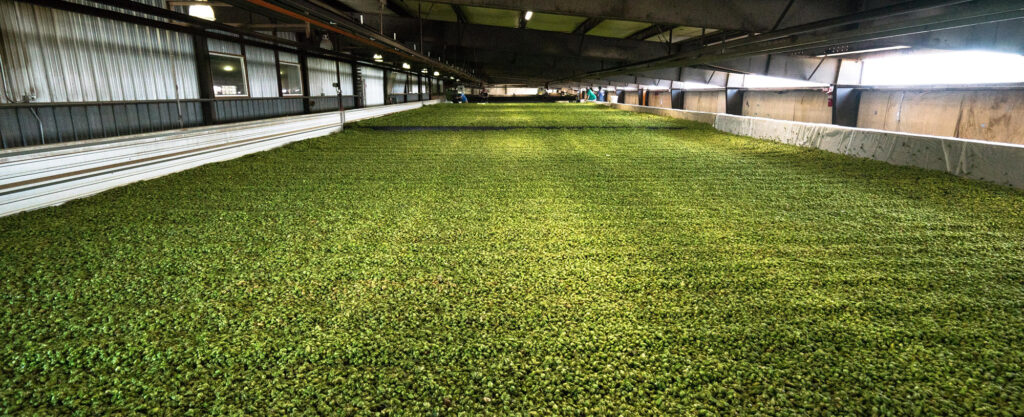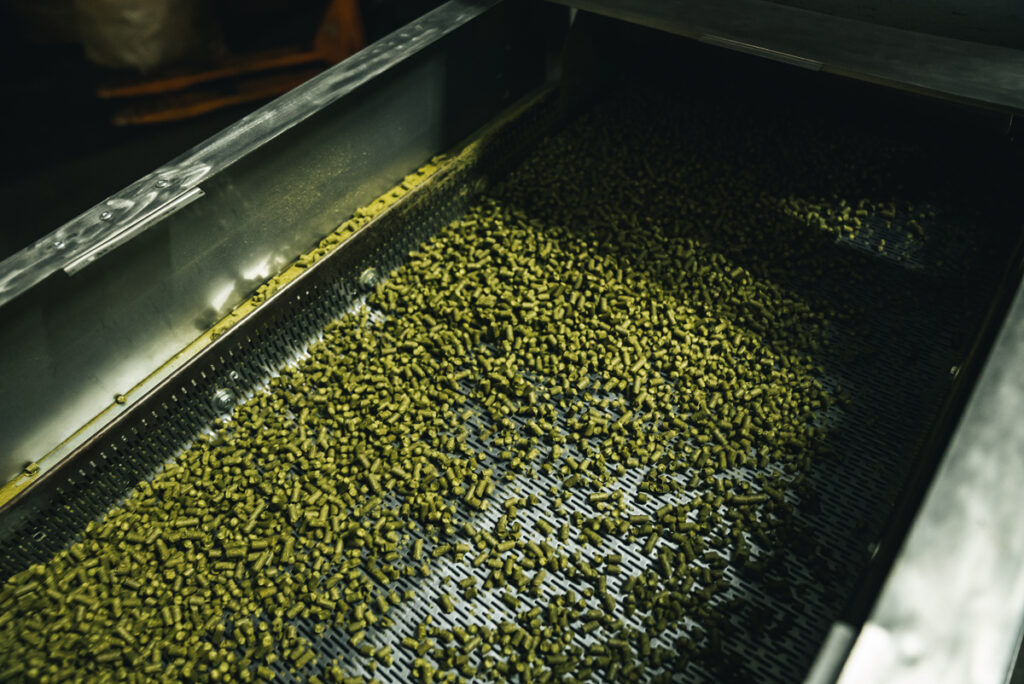Leaf hops vs pellet hops cause more heated debate among brewers than anything else. I suggest that it is difficult to dispute that pellets are better where it counts. Flavour, storage capacity and ease of use.

This is not intended as anti-leaf propaganda, and it should be noted that leaf hops do give off more apparent floral notes. If you want that in your beer, then whole-leaf hops are definitely advised. In any other sense, pellets are definitely a better choice. Even when it comes to the actual taste of the beer. They impart character quicker than leaf hops do. They provide more flavour, and, most importantly, they are more consistent in flavour.
There is something romantic about using actual hops in your brewing, and there is something to be said about that. However, nothing is romantic about cleaning out the mess of spent hops from brewing and fermenting vessels, including clogged valves. Or ending up with a poorly hopped end-product because of the varying hop alpha and difficulty in correctly estimating hop utilisation.
Pelletised hops are whole hops crushed into pellet form. This occurs within two or three days from harvest – while the hops are still fresh. In the process, the leaves and stalks of the hop are removed, leaving only the cones in the pellets. Because pellets no longer look natural but instead industrial, some brewers think they are inferior to using actual hops, but this is not true.
Better Flavour
Firstly hop pellets give more flavour than whole-cone hops. Studies show that hop pellets give roughly 10% more bitterness, flavour and aroma than whole-cone. In crushing hops for making hop pellets, the lupulin glands inside the hops are crushed. Which means you get a better extraction rate of alpha acid – leading to more bitterness when the alpha acid is isomerised in the boil.
In many blind tests, pellet hops have come out on top regarding flavour. Scientists have found similar results by analysing the chemical compounds in the flavour profiles. Various tasting studies report similar results. The flavour intensity was favourably affected by the use of hop pellets compared to whole-cone hops. It has also been shown that pellets increase the flavour stability brew-to-brew.
These are some of the cited reasons that pellets are preferred to whole-cone by professionals who want consistency in their products.
Having said all this, many people claim that whole-cone gives off a better flavour when it comes to dry hopping. However, the results from blind tests are inconclusive. On top of this, whole cone hops introduce more oxygen to the beer and soak up more of the wort, and they are also impractical in the brewing process for the reasons given below.
Easier Storage
Having tried to deal with the big, contentious issue – which type tastes better – we can talk about what everyone agrees on pellets are way more practical, not least because of how easy they are to store.
Pelletised hops take up less space, and pellets have less surface area. So they oxidize more slowly, which means they stay fresh longer and have a better flavour for longer. Pellets have a lower rate of alpha loss than whole-leaf hops. With only a 10-20% loss over 12 months at 20oC and almost no loss in a frozen state. They last up to 3 years in a regular refrigerator. On the other hand, whole-leaf hops last approximately 6 months. In the best-case scenario, up to 1 year, by which time they will not give anything close to their original flavour. Smelly socks and parmesan cheese have both been used to describe the smell of old hops.
Very fresh whole-leaf hops may be equally good as (some would claim superior to) pellets. But the high alpha loss rate removes any advantage, and only brewing with fresh, seasonal whole-leaf hops would restrict brewing to three months a year!

Leaf hops vs Pellet – Easier Brewing with hop pellets
Using whole-leaf hops produces more mess to clean up and can clog up the nozzles and valves of your brewing vessel. Dry hopping in the fermenter produces another problematic cleaning job. Pelletised hops are generally hosed out with minimal effort.
It is advisable to use a muslin bag when dry hopping with whole-leaf and to weigh down the buoyant leaves. Ensuring they are wetted and the flavour gets into the liquid. This means you typically need to use 10-15% more hops (because of the muslin bag retains some flavour). Increasing the cost of dry hopping with whole-leaf hops.
Pellets, on the other hand, avoid many of these problems. They are small and easy to handle and eliminate most of the issues you will have with whole-leaf hops in the dry-hopping process. They also soak up less wort than whole-leaf hops, leaving you with more beer! The one problem with pellets is that they give more trub if used loose in, for example, a dry hopping situation.
This may lead to some clogging issues similar to whole-leaf hops. These can be solved by using a muslin bag when brewing and/or a strainer on your siphon when siphoning the beer. Also, you should use a finer strainer when brewing with pellets so that less hop matter transfers to the bottle.
In short leaf hops vs pellet: Choose pellets (most of the time)
The bottom line is that pellets are not only easier to store and use. They are more consistent when it comes to their flavour and they actually give off more flavour. Seemingly contrary to popular belief among some brewers. While there is something to be said for the romantic factor of using whole leaf hops “the way it has always been”, they do give off better floral notes. For example, pelletised hops, in our opinion, win in the long run on usability, storability, cost-effectiveness and, most importantly the end result.
I may be harbouring a certain bias. When I started brewing full-time professionally on the 13th of August 1979 at a brewery with a German-designed brewhouse it was specially designed for pelletised hops. Several years before I became familiar with the problems associated with whole hop usage.
Geterbrewed Supply Commercial brewers & homebrewers with hops :
Written by our friend George Thompson Brewing Consultant